Garden Maintenance in Putney: Expert Tips for a Lush, Beautiful Garden
Introduction to Garden Maintenance in Putney
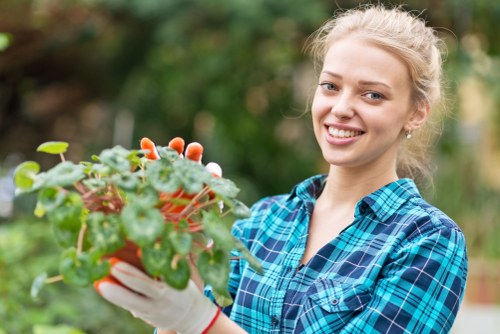
Maintaining a beautiful garden in Putney requires a blend of passion, knowledge, and the right techniques. Whether you're a seasoned gardener or just starting out, understanding the unique characteristics of Putney's climate and soil can make all the difference in achieving a vibrant and thriving garden.
Putney's temperate climate, with its mild winters and warm summers, provides an excellent environment for a wide variety of plants. However, local conditions such as soil type, rainfall patterns, and urban exposure can influence garden maintenance strategies significantly.
In this article, we'll explore comprehensive garden maintenance tips tailored specifically for Putney. From seasonal care to pest management, you'll find everything you need to cultivate a stunning outdoor space.
Understanding Putney’s Climate and Soil
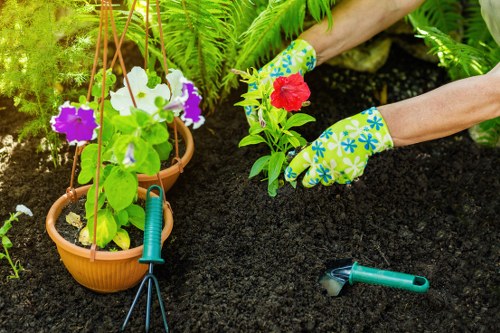
Putney enjoys a temperate maritime climate, characterized by mild winters and warm summers. This climate is conducive to growing a diverse range of plants, including perennials, annuals, shrubs, and trees. Understanding the nuances of Putney's weather patterns is essential for effective garden maintenance.
The soil in Putney varies across different areas, with a mix of clay, loam, and sandy soils. Conducting a soil test can help determine the pH level and nutrient content, allowing you to amend the soil appropriately. Well-draining soil is crucial to prevent waterlogging, which can lead to root rot and other plant diseases.
Incorporating organic matter, such as compost or well-rotted manure, can improve soil structure, enhance nutrient availability, and promote healthy microbial activity. This organic amendment not only benefits plant growth but also contributes to long-term soil fertility.
Seasonal Garden Maintenance Tasks
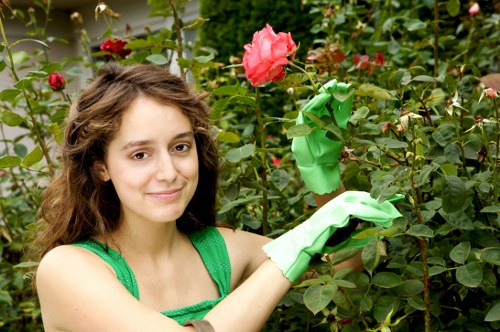
Effective garden maintenance in Putney involves performing specific tasks tailored to each season. Here's a month-by-month guide to help you stay on top of your garden's needs throughout the year:
- Spring: Prepare beds, plant new flowers and vegetables, prune damaged branches.
- Summer: Regular watering, weeding, and harvesting ripe produce.
- Autumn: Clear fallen leaves, plant autumn-blooming plants, prepare for winter.
- Winter: Protect sensitive plants, plan for the upcoming gardening season, and perform tool maintenance.
Adhering to these seasonal tasks ensures that your garden remains healthy and continues to flourish throughout the year.
Plant Selection for Putney Gardens
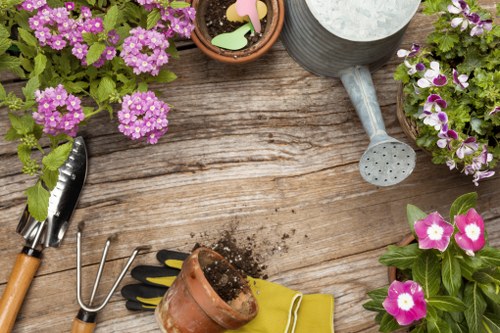
Choosing the right plants is pivotal for creating a resilient and attractive garden in Putney. Opt for plants that are well-suited to the local climate and soil conditions. Some popular choices include:
- Roses: Thrive in Putney's climate, offering a wide range of colors and fragrances.
- Lavender: A hardy perennial that attracts pollinators and provides a pleasant aroma.
- Hostas: Ideal for shaded areas, these plants offer lush foliage and easy maintenance.
- Hydrangeas: Produce beautiful blooms and adapt well to various soil types.
Selecting a combination of perennials and annuals can provide continuous color and interest throughout the growing season.
Lawn Care and Maintenance
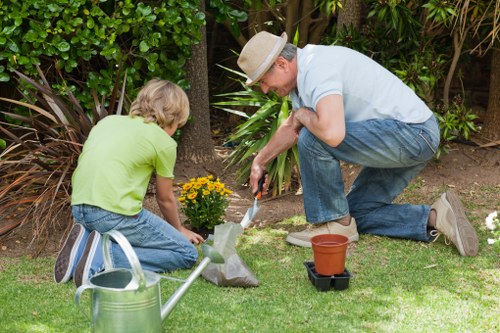
A well-maintained lawn serves as the foundation of a beautiful garden. Proper lawn care in Putney involves regular mowing, watering, and fertilization. Mowing should be done at the recommended height for your grass type to promote healthy growth and prevent weed invasion.
Watering is crucial, especially during dry spells. Deep, infrequent watering encourages deep root growth, enhancing the lawn's drought resistance. Additionally, aerating the soil annually can alleviate compaction, improve water penetration, and foster a robust root system.
Fertilizing the lawn with a balanced fertilizer in spring and autumn provides essential nutrients, ensuring a lush and green appearance. Addressing any signs of disease or pest infestation promptly can prevent widespread damage.
Pruning and Trimming Techniques
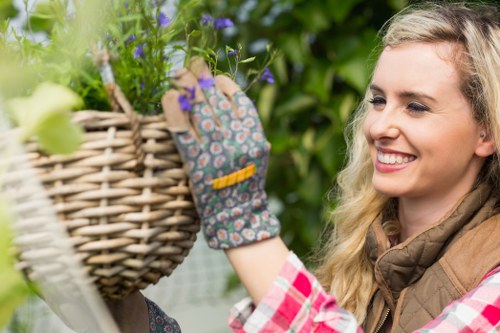
Pruning and trimming are essential for maintaining the shape, health, and productivity of your plants. Proper pruning techniques can enhance air circulation, reduce the risk of disease, and encourage vigorous growth.
For flowering shrubs and trees, prune immediately after the blooming period to avoid cutting off next season's buds. Remove any dead, diseased, or crossing branches to maintain a strong structure.
Regularly trimming hedges and maintaining the edges of garden beds not only improves the aesthetic appeal of your garden but also promotes healthy growth by preventing overgrowth and ensuring adequate light and air exposure.
Pest and Disease Control
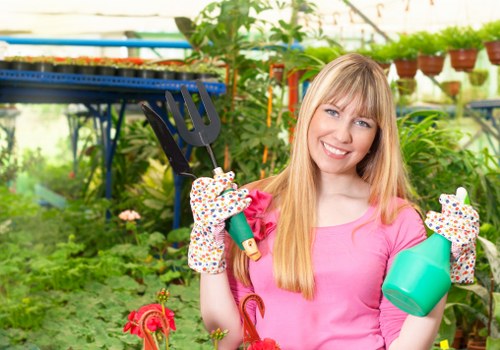
Protecting your garden from pests and diseases is a critical aspect of garden maintenance in Putney. Implementing integrated pest management (IPM) strategies can effectively manage unwanted visitors while minimizing environmental impact.
- Identification: Accurate identification of pests and diseases is the first step in effective control.
- Prevention: Maintain plant health through proper watering, fertilization, and sanitation to prevent infestations.
- Biological Controls: Introduce natural predators like ladybugs and beneficial nematodes to keep pest populations in check.
- Chemical Controls: Use pesticides judiciously and opt for organic or least-toxic options whenever possible.
Regular monitoring and early intervention can significantly reduce the risk of severe pest and disease outbreaks.
Soil Management and Fertilization
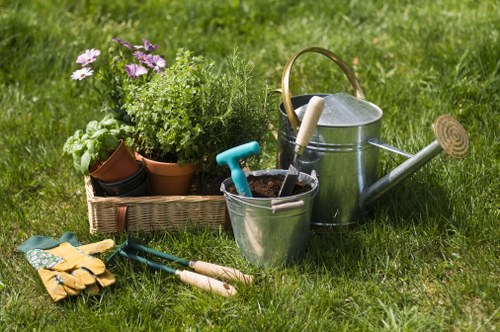
Healthy soil is the cornerstone of a thriving garden. Implementing effective soil management practices can enhance soil fertility, structure, and microbial activity, leading to robust plant growth.
Regularly adding organic matter, such as compost or green manure, can improve soil texture, increase nutrient content, and boost water retention. Additionally, practicing crop rotation and avoiding planting the same species in the same location year after year can prevent soil-borne diseases and nutrient depletion.
Fertilizing plants based on their specific needs ensures they receive the necessary nutrients without over-fertilization, which can harm plant health and lead to environmental pollution.
Watering Strategies for a Sustainable Garden
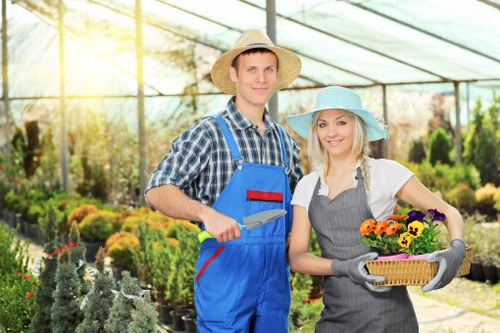
Efficient watering is vital for maintaining a sustainable garden in Putney. Implementing smart watering techniques can conserve water, reduce utility costs, and promote healthy plant growth.
- Drip Irrigation: Delivers water directly to the plant roots, minimizing evaporation and runoff.
- Rainwater Harvesting: Collecting and storing rainwater can provide a natural and cost-effective water source for your garden.
- Mulching: Applying a layer of mulch helps retain soil moisture, suppress weeds, and regulate soil temperature.
- Watering Schedule: Water early in the morning or late in the evening to reduce evaporation and ensure plants receive adequate hydration.
By adopting these strategies, you can maintain a lush garden while being mindful of water conservation.
Tools and Equipment for Garden Maintenance
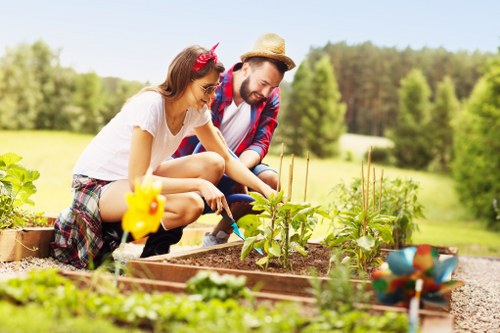
Having the right tools and equipment is essential for efficient and effective garden maintenance. Investing in quality tools can make gardening tasks easier and more enjoyable.
Essential tools for garden maintenance in Putney include:
- Pruning Shears: For precise trimming of branches and stems.
- Lawn Mower: Keeps your lawn neat and well-maintained.
- Gardening Gloves: Protect your hands from thorns, dirt, and potential injuries.
- Spade and Fork: For digging, turning soil, and aerating garden beds.
- Watering Can or Hose: Ensure your plants receive adequate moisture.
Regular maintenance and proper storage of your tools will extend their lifespan and ensure they remain in good working condition.
Mulching: Benefits and Best Practices
[IMG_11]Mulching is a valuable practice in garden maintenance that offers numerous benefits. Applying a layer of mulch around your plants can enhance soil health, conserve moisture, and suppress weed growth.
Benefits of Mulching:
- Retains soil moisture, reducing the need for frequent watering.
- Regulates soil temperature, protecting roots from extreme conditions.
- Suppresses weeds, minimizing competition for nutrients and water.
- Improves soil structure as organic mulches decompose.
When selecting mulch, consider organic options like shredded bark, straw, or compost, which add nutrients to the soil as they break down. Apply a 2-3 inch layer around your plants, ensuring not to pile mulch against plant stems or tree trunks to prevent rot and disease.
Pruning Trees and Shrubs
[IMG_12]Pruning is essential for maintaining the health and aesthetics of trees and shrubs in your Putney garden. Proper pruning techniques can enhance plant structure, encourage new growth, and prevent potential hazards.
When pruning, always use clean, sharp tools to make precise cuts. Focus on removing dead, diseased, or damaged branches first. For shaping, follow the natural form of the plant, avoiding excessive pruning that can stress the plant.
Different plants have varying pruning requirements. For instance, flowering shrubs are best pruned immediately after blooming, while evergreen trees benefit from pruning in late winter or early spring.
Composting: Turning Waste into Gold
[IMG_13]Composting is a sustainable practice that transforms organic waste into nutrient-rich compost, benefiting your garden in numerous ways. By recycling kitchen scraps, garden trimmings, and other biodegradable materials, you can reduce waste and enhance soil fertility.
To start composting, designate a compost bin or pile in a well-ventilated area. Maintain a balanced mix of green materials (e.g., vegetable scraps, grass clippings) and brown materials (e.g., dry leaves, straw) to promote decomposition.
Regularly turning the compost ensures adequate aeration and accelerates the breakdown process. In a few months, you'll have dark, crumbly compost that can be incorporated into your garden beds to improve soil structure and provide essential nutrients to your plants.
Integrated Pest Management (IPM) Strategies
[IMG_14]Integrated Pest Management (IPM) is an eco-friendly approach to controlling garden pests while minimizing harm to beneficial organisms and the environment. Implementing IPM strategies can help maintain a balanced ecosystem in your Putney garden.
Key components of IPM include:
- Regular Monitoring: Inspect plants frequently for signs of pests or diseases.
- Identification: Accurately identify pests to determine appropriate control measures.
- Preventive Measures: Use cultural practices like crop rotation, companion planting, and sanitation to deter pests.
- Biological Controls: Introduce natural predators or beneficial insects to manage pest populations.
- Chemical Controls: Apply pesticides only as a last resort and choose environmentally friendly options.
By adopting IPM, you can effectively manage pests while promoting a healthy and sustainable garden environment.
Choosing the Right Fertilizer
[IMG_15]Selecting the appropriate fertilizer is crucial for supporting plant growth and maintaining soil health. The choice of fertilizer depends on your soil's current nutrient levels, the specific needs of your plants, and the type of plants you are cultivating.
Types of Fertilizers:
- Organic Fertilizers: Derived from natural sources like compost, manure, and bone meal. They improve soil structure and provide slow-release nutrients.
- Inorganic Fertilizers: Manufactured chemical fertilizers that offer immediate nutrient availability. They are often more concentrated and easier to apply.
- Granular Fertilizers: Suitable for slow-release applications, providing nutrients over an extended period.
- Liquid Fertilizers: Ideal for quick nutrient uptake, often used for foliar feeding.
Conducting a soil test can help determine the specific nutrient needs of your garden, ensuring you choose a fertilizer that complements your soil's existing composition.
Mulching for Weed Control and Moisture Retention
[IMG_16]Mulching serves multiple functions in garden maintenance, including weed suppression, moisture retention, and soil temperature regulation. By applying a layer of mulch around your plants, you create a protective barrier that inhibits weed growth and reduces water evaporation from the soil.
There are various types of mulch available, each offering different benefits:
- Organic Mulch: Includes materials like straw, wood chips, and compost. These mulches enrich the soil as they decompose.
- Inorganic Mulch: Comprises materials like gravel, plastic sheeting, or landscape fabric. They are long-lasting and effective for immediate weed control.
To mulch effectively, apply a 2-3 inch layer around plants, ensuring not to cover the plant stems or trunks. This practice not only enhances the appearance of your garden but also promotes healthier plant growth.
Water Management: Irrigation Systems and Techniques
[IMG_17]Effective water management is essential for sustaining a healthy garden, especially during the warmer months in Putney. Investing in an efficient irrigation system can help ensure your plants receive adequate hydration while conserving water.
Types of Irrigation Systems:
- Drip Irrigation: Delivers water directly to the plant roots through a network of tubes and emitters, minimizing water waste.
- Sprinkler Systems: Provides broad coverage, suitable for lawns and larger garden areas.
- Soaker Hoses: Similar to drip irrigation, these hoses release water slowly along their length, ideal for garden beds.
Additionally, incorporating rain barrels and scheduling watering during the early morning or late evening can further enhance water efficiency and reduce evaporation losses.
Benefits of Professional Garden Maintenance Services
[IMG_18]While DIY garden maintenance offers flexibility and cost savings, enlisting the help of professional garden maintenance services in Putney can provide several advantages. Professionals bring expertise, experience, and specialized tools to ensure your garden remains in optimal condition.
Benefits of hiring professionals include:
- Expert Knowledge: Professionals understand local gardening conditions and can offer tailored advice and solutions.
- Time Savings: Outsourcing maintenance tasks frees up your time for other activities.
- Consistent Results: Regular professional care ensures your garden remains healthy and aesthetically pleasing year-round.
- Access to Specialized Equipment: Professionals have access to tools and machinery that may be costly or impractical for personal use.
For those seeking a hands-off approach or requiring advanced garden care, professional services can be a valuable investment.
Creating a Sustainable Garden in Putney
[IMG_19]Sustainability in gardening not only benefits the environment but also contributes to the long-term health and productivity of your garden. Implementing sustainable practices in Putney can help you create an eco-friendly and resilient outdoor space.
Key sustainable gardening practices include:
- Composting: Recycles organic waste into valuable soil amendments.
- Rainwater Harvesting: Reduces reliance on tap water and conserves natural resources.
- Native Plant Selection: Native plants are adapted to local conditions, requiring less water and maintenance.
- Organic Pest Control: Minimizes chemical usage, promoting a healthier ecosystem.
By embracing these practices, you contribute to environmental conservation while enhancing the beauty and sustainability of your Putney garden.
Final Thoughts on Garden Maintenance in Putney
[IMG_20]Maintaining a garden in Putney is a rewarding endeavor that combines creativity, knowledge, and dedication. By understanding the local climate, selecting appropriate plants, and implementing effective maintenance practices, you can cultivate a vibrant and enduring garden space.
Whether you choose to undertake garden maintenance yourself or seek professional assistance, the key is consistency and attention to detail. Regular care and timely interventions will ensure your garden remains a source of beauty and enjoyment for years to come.
Ready to transform your Putney garden? Contact us today to learn more about our expert garden maintenance services and take the first step toward a thriving outdoor sanctuary.

